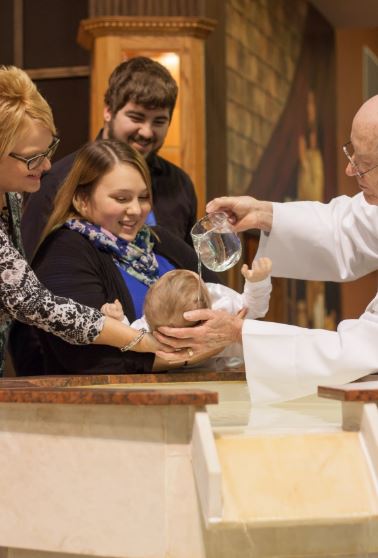It was Peter Clark who in 1752 when writing a Defense of the Divine right of infant Baptism was adamant that it was indeed a Biblical doctrine and not one instituted of the Catholic Church. Thus John Gill, writing in an argument against infant baptism and in the argument against Clark’s assertions went on as well to say as much when he wrote:
“Paedobaptists are ever restless and uneasy, endeavoring to maintain and support, if possible, their unscriptural practice of infant-baptism; though it is no other than a pillar of popery; that by which Antichrist has spread his baneful influence over many nations; is the basis of national churches and worldly establishments; that which unites the church and world, and keeps them together; nor can there be a full separation of the one from the other, nor a thorough reformation in religion; until it is wholly removed: and though it has so long and largely obtained, and still does obtain; I believe with a firm and unshaken faith, that the time is hastening on, when infant-baptism will be no more practiced in the world; when churches will be formed on the same plan they were in the times of the apostles; when gospel-doctrine and discipline will be restored to their primitive lustre and purity; when the ordinances of baptism and the Lord’s Supper will be administered as they were first delivered, clear of all present corruption and superstition; all which will be accomplished, when the Lord shall be king over all the earth, and there shall be one Lord and his name one.”
Children and Baptism
Was it not a ploy to engage Christians to publically mark their children so as to add strength and membership to the church? Was it not a way to develop Christendom from a worldly standpoint, rather than to have spiritually regenerated members of the household of faith? One should think so.
 Of all the Scripture used in the New Testament to speak of household baptisms, which would relate to families, not a single verse can successfully be used, except the argument of silence to exonerate the infant baptismal argument. The list, fully exhausted is as follows: Acts 11:5-15, Acts 16:25-33 and Acts 16:14-15, and 1 Corinthians 1:16. None of which can give a single child mentioned, but only those believing that were baptized. Only those who believed received the Holy Ghost, and how would one know that an infant received the Holy Ghost? What evidences would follow such a powerful act? It would be clear that some professions would follow so that one would know that a person actually believed.
Of all the Scripture used in the New Testament to speak of household baptisms, which would relate to families, not a single verse can successfully be used, except the argument of silence to exonerate the infant baptismal argument. The list, fully exhausted is as follows: Acts 11:5-15, Acts 16:25-33 and Acts 16:14-15, and 1 Corinthians 1:16. None of which can give a single child mentioned, but only those believing that were baptized. Only those who believed received the Holy Ghost, and how would one know that an infant received the Holy Ghost? What evidences would follow such a powerful act? It would be clear that some professions would follow so that one would know that a person actually believed.
The nature of baptism is evident in that is joins a person visibly with the church and with a saving Lord. It is agreeable that the definition in the Westminster Confession of Faith is essentially biblical:
“Baptism is a sacrament of the New Testament, ordained by Jesus Christ, not only for the solemn admission of the party baptized into the visible church, but also to be unto him a sign and seal of the covenant of grace, of his ingrafting into Christ, of regeneration, of remission of sins, and of his giving up unto God through Jesus Christ, to walk in newness of life . . .” (Chapter XXVIII)
The London Baptist confession is equally clear:
“Baptism is an ordinance of the New Testament, ordained by Jesus Christ, to be to the person who is baptised – a sign of his fellowship with Christ in His death and resurrection; of his being engrafted into Christ; of remission of sins; and of that person’s giving up of himself to God, through Jesus Christ, to live and walk in newness of life. Those who actually profess repentance towards God, faith in, and obedience to, our Lord Jesus Christ, are the only proper subjects for this ordinance.” Part 29 points 1 and 2
Faith in the Lord Jesus Christ
In every clear and understandable place that someone was born again, there was a clear and credible confession of faith in the Lord Jesus Christ, thus removing any question as to the discernment and age of the individual. They were all mature enough to know what was happening to them.
B.B. Warfield, who was candid enough when referring to Matthew 19:13, where Jesus said to suffer the little children to come unto me, to state the following:
“What has this [verse] to do with infant baptism?”
 Again, another verse, Acts 2:39 has been used to defend the act of infant baptism, because the verse states it is to you and your children and often, this is all that is quoted. There is more!
Again, another verse, Acts 2:39 has been used to defend the act of infant baptism, because the verse states it is to you and your children and often, this is all that is quoted. There is more!
The verse goes on to say “And all that are afar off,” and then give the clarification of what their children and those who are afar off need: a direct calling of the Lord. It is not based on relation to the saved parent any more than a relation of those that are “afar off” might have with those being saved. Only those who are called will receive regenerating grace.
Anyone who holds to the regulative principle of worship must abandon it in light of the teaching of infant baptism and run to the normative principle if they desire to support such a belief. What is clearly stated in Scripture is evident and that which is not stated is impossible to substantiate.
One must finally, as B.B. Warfield did, just admit it is something done because one wants to believe it is there in Scripture, even though it is not, thus until it is seen to be forbidden, one can practice it:
“It is true that there is no express command to baptize infants in the New Testament, no express record of the baptism of infants and no passage so stringently implying it that we must infer from them that infants were baptized. If such warrant as this were necessary to justify the usage, we would have to leave it completely unjustified. But the lack of this express warrant is something far short of forbidding the rite; and if the continuity of the church through all ages can be made good, the warrant for infant baptism is not to be sought in the New Testament, but in the Old Testament where the church was instituted and nothing short of an actual forbidding of it in the New Testament would warrant our omitting it now.”
Infant Baptism and Adult Baptism
Adult Baptism only occurs when someone professes Christ as Lord and Saviour.
Infant Baptism occurs when a Parent decides for the child that they want them baptized.
Adult Baptism occurs as a result of a congregation believing that faith has truly been applied to the recipient.
Infant Baptism occurs when there is hope that there is faith being applied to the recipient, without any pieces of evidence such as those found in the fruit of the Spirit as detailed in Galatians 5.
Adult Baptism puts a person in the visible church so they can now be active in the government and participate in the Lord’s supper.
Infant Baptism also puts a person into the visible church, but they are now restricted from being active in any governmental decisions and are forbidden to take the Lord’s supper. They are treated as one “in sin” and therefore restricted.
Adult Baptism puts an expectation on the person to walk godly, and be answerable to the church (via discipline) if they sin.
Infant Baptism leaves the child in the exact state they were in, unable to be answerable to the church because they are too small and unable to even speak, or receive any constructive discipline from the church.






